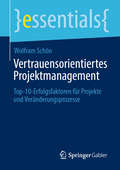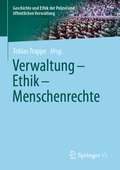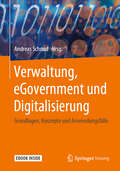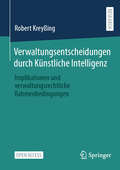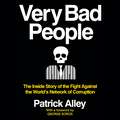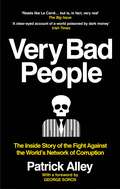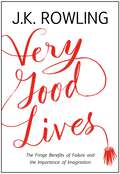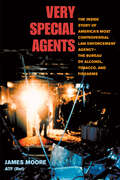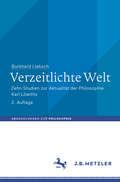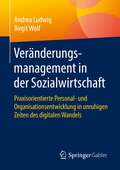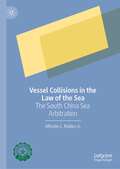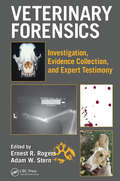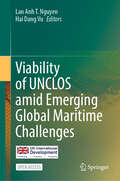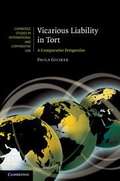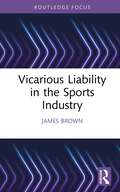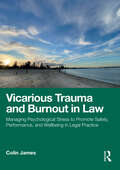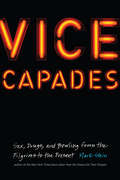- Table View
- List View
Vertrauen. Macht. Wirtschaft.: Sicher führen in unsicheren Zeiten
by Branko Woischwill Nicole BogottFür eine florierende Wirtschaft sind vertrauensvolle Interaktionen elementar: Wirtschaft bedeutet Beziehungsarbeit. Dieses Buch untersucht die Frage, wie eine nachhaltige Vertrauenskultur Macht aufbauen, gestalten und vertiefen kann. Das Power Triangle®-Modell zeigt Führungskräften, wie sie mithilfe von Netzwerken, Ressourcen und Wissen Macht beeinflussen. Neben fundierten Analysen präsentieren Bogott und Woischwill praxisorientierte Handlungsvorschläge. In 21 Interviews kommen Expert:innen global agierender Konzerne wie Coca-Cola, Henkel, Porsche und SAP mit ihren Erfahrungen und Konzepten zu Wort, darunter Leo Hoffmann-Axthelm, Gründungsmitglied von ICAN, Träger des Friedensnobelpreises. – Mit einem Geleitwort der Investorin und Bundestagsabgeordneten a.D. Dagmar Wöhrl.
Vertrauensorientiertes Projektmanagement: Top-10-Erfolgsfaktoren für Projekte und Veränderungsprozesse (essentials)
by Wolfram SchönVeränderungsprozesse sind für die wirtschaftliche Entwicklung jedes Unternehmens von großer Bedeutung. Dennoch sind die „Failure Rates“ in IT- und Veränderungsprojekten bedenklich hoch. Die Gründe für das Scheitern sind vielschichtig, und es steht fest, dass selbst ein handwerklich gutes Projektmanagement heute allein nicht mehr ausreicht, um ein Projekt sicher zum Erfolg zu führen. Um Projekte erfolgreich zu gestalten, gilt es, das Thema Vertrauen als fundamentalen Erfolgsparameter in die Projektplanung und -kommunikation zu integrieren. Wie können Projekte und Veränderungsprozesse durch eine Vertrauensorientierung erfolgreicher gemacht werden? Das ist die Kernfrage, die beantwortet wird und darin liegt der Nutzen für den Leser.
Verwaltung - Ethik - Menschenrechte (Geschichte und Ethik der Polizei und öffentlichen Verwaltung)
by Tobias TrappeTrotz der mitunter eingreifenden Gegenwart von Polizei und Verwaltung im Leben und Alltag der Menschen fehlt es in der Bundesrepublik aktuell an einer Ethik der öffentlichen Verwaltung - anders als im europäischen und internationalen Umfeld. Der Band versucht vor diesem Hintergrund einige konzeptionelle Linien auszuziehen, um eine ethisch-normative Reflexion der Verwaltung einschließlich ihrer menschenrechtlichen Verpflichtungen anzuregen.
Verwaltung, eGovernment und Digitalisierung: Grundlagen, Konzepte und Anwendungsfälle
by Andreas SchmidEine effizient und effektiv arbeitende öffentliche Verwaltung ist die Voraussetzung für Wirtschaftswachstum und gesellschaftlichen Wohlstand. Hierfür sind eine moderne Informationstechnik und hochqualifiziertes Personal in der öffentlichen Verwaltung wesentliche Voraussetzungen. Die Informationstechnik entwickelt sich derzeit unter dem Begriff der „Digitalisierung“ rasant weiter und die demografische Entwicklung macht die Personalgewinnung herausfordernd. Die Verwaltung steht daher vor großen Herausforderungen. Sucht man für die zugrundeliegenden Fragestellungen nach Antworten, so ergibt sich ein heterogenes Bild von Strategien, Konzepten, Ansätzen und (gescheiterten) Projekten.Dieses Herausgeberwerk schafft Übersicht zu Strategien, Konzepten, Ansätzen und Projekten. Im ersten Teil dieses Buches gehen die Beitragsautoren auf die wichtigsten konzeptionellen Grundlagen ein. Hierzu zählen u. a. die Verwaltungsinformatik als wissenschaftliche Disziplin, strategische Überlegungen und die Schaffung notwendiger organisatorischer und personeller Voraussetzungen in der öffentlichen Verwaltung. Der zweite Teil umfasst Praxisbeispiele aus der öffentlichen Verwaltung als „Best Practices“, u. a. zu den Themenfeldern „Blockchain“, „Big Data“, „Digitalisierte Informationsaufbereitung“, „Automatisierung“ und „Dunkelverarbeitung“. Durch die Kombination von Theorie und Praxis liefert dieses Werk Impulse für die praktische (Projekt-)Arbeit und für weitere wissenschaftliche Diskussionen, die IT-Infrastrukturen im Kontext des eGovernment in Kommunen und Verwaltungsgemeinschaften weiter vorantreiben. Daher richtet sich dieses Buch über Verwaltungsinformatik insbesondere an:IT-Leiter auf Führungsebene sowie Mitarbeiter im Informationsmanagement öffentlicher VerwaltungenDozenten und Lehrende der Informatik und Wirtschaftsinformatik
Verwaltungsentscheidungen durch Künstliche Intelligenz: Implikationen und verwaltungsrechtliche Rahmenbedingungen
by Robert KreyßingDas vorliegende Open-Access-Buch untersucht die rechtlichen Rahmenbedingungen und Implikationen des Einsatzes von KI-Systemen in der Verwaltung. In Zeiten disruptiver technologischer Fortschritte stellt sich die Frage, ob und wie Künstliche Intelligenz in der öffentlichen Verwaltung eingesetzt werden kann. Durch eine umfassende Analyse bestehender Regelungen und der rechtlichen Diskussion zeigt die Arbeit auf, ob KI-Systeme im Verwaltungsverfahren eingesetzt werden können. Damit neben dem Fortgang des wissenschaftlichen Diskurses eine Hilfestellung für die Praxis erreicht wird, fokussiert sich die Arbeit insbesondere auf die verwaltungsrechtlichen Rahmenbedingungen.
Verwaltungswissenschaft: Band 1: Theoretische und methodische Grundlagen
by Eberhard BohneDas Buch bietet eine Einführung in die Verwaltungswissenschaft. Das Buch richtet sich an Studierende aller Fachrichtungen, die sich mit Problemen der öffentlichen Verwaltung befassen, sowie an alle Angehörigen von Verwaltungsberufen innerhalb und außerhalb des öffentlichen Dienstes.
Verwaltungswissenschaft: Band 2: Grundzüge der öffentlichen Verwaltung in Deutschland
by Eberhard Bohne Christian BauerDas Lehrbuch enthält den Besonderen Teil der Verwaltungswissenschaft und knüpft an Bd. 1 mit dem Allgemeinen Teil an. Das Lehrbuch gibt einen systematischen, interdisziplinären Überblick über Aufgaben, Handlungsformen und Organisation, den Öffentlichen Dienst sowie über das Finanz- und Haushaltswesen der öffentlichen Verwaltung in Deutschland. Ausgehend von dem Rollenverhältnis des Bürgers gegenüber der öffentlichen Verwaltung, stellt das Lehrbuch die Haupttypen der öffentlichen Verwaltung dar – Polizei und Ordnungsverwaltung, Wirtschaftsaufsicht, Umweltaufsicht, Leistungsverwaltung, Infrastrukturverwaltung und Ko-Produktion öffentlicher Leistungen durch Bürger und öffentliche Verwaltung. Die Darstellung verbindet eine ökonomische, politische und rechtliche Perspektive. Bd. 1 und 2 bilden zusammen ein umfassendes, systematisches Kompendium der Verwaltungswissenschaft für Studium, Lehre und Praxis.
Verwertung kommerzieller Rechte im Sportmarketing: Theorieüberblick und Praxiseinblick
by Andreas BergmannIn diesem Lehrbuch lernen Sie die Grundlagen der Sportvermarktung sowie verschiedene Ausprägungen und Erscheinungsformen der Verwertung gewerblicher Rechte im Sport kennen. Anhand zahlreicher Praxisbeispiele, Statistiken und Studienergebnisse bekommen Sie eine realistische Vorstellung von der Größenordnung, in der sich die Sportvermarktung in Deutschland und weltweit bewegt und welche Anwendungsfälle in diesem Sektor von Relevanz sind. Des Weiteren lernen Sie die theoretische Verortung der Sportvermarktung aus Management- bzw. Marketing- und Kommunikationssicht kennen und können sich mit den rechtlichen Hintergründen vertraut machen. Insgesamt erhalten Sie mit diesem Lehrbuch ein breites Grundlagenwissen zum Thema Sportvermarktung.
Very Bad People: The Inside Story of the Fight Against the World’s Network of Corruption
by Patrick Alley*****'Reads like a John le Carré novel but is, in fact, very real.' - The Big Issue'Very Bad People would be a hugely enjoyable thriller if it wasn't all true.' - Isabella Tree, author of Wilding'Global Witness are fearless.' - Gordon Roddick, Campaigner and Co-Founder of the Body Shop'Part true crime tale, part investigative procedural, this is the account of the brilliant and necessary superheroes of Global Witness, whose superpower is the truth.' - Edward Zwick, Director of Blood Diamond 'Very Bad People reads like a non-stop high-speed chase as our fighters against corruption hunt down a litany of criminals and con-men, some on the fringes of our society, some embedded high up within it. It's a great story and an important one.' - David Farr, Screenwriter, The Night Manager'The story told in this book of three youthful idealists who go from eating cold baked beans in a drafty London flat to the Thai-Cambodian border where they posed as traders in illegally felled timber is simply riveting. Don't miss it.' - Misha Glenny, author of McMafia'Alley has produced a clear-eyed account of a world poisoned by dark money, and a welcome reminder that resistance is possible. As it turns out, his book is even more timely than he could have hoped.' - Irish Times'This book is inspirational. It shows how young people with sufficient passion and intelligence have the capacity to go after some of the most powerful governments and corporations and shame, humiliate and just push governments to support important reforms that can make this a more decent world.' - Frank Vogl, Co-Founder of Transparency InternationalArms trafficking, offshore accounts and luxury property deals. Super-yachts, private jets and super-car collections. Blood diamonds, suspect oil deals, deforestation and murder. This is the world of Global Witness, the award-winning organisation dedicated to rooting out worldwide corruption. And this is co-founder Patrick Alley's revealing inside track on a breath-taking catalogue of modern super-crimes - and the 'shadow network' that enables them. VERY BAD PEOPLE is about following the money, going undercover in the world's most dangerous places, and bringing down the people behind the crimes. Case by case we see maverick investigators pitched against warlords, grifters and super-villains who bear every resemblance to The Night Manager's Richard Roper. One dictator's son spent $700 million in just four years on his luxury lifestyle.As they unravel crooked deals of labyrinthine complexity, the team encounter well-known corporations whose operations are no less criminal than the Mafia. This network of lawyers, bankers and real estate agents help park dirty money in London, New York, or in offshore accounts, safe from prying eyes.Patrick Alley's book is a brilliant, authoritative and fearless investigation into the darkest workings of our world - and an inspiration to all of us who want to fight back.
Very Bad People: The Inside Story of the Fight Against the World’s Network of Corruption
by Patrick Alley*****'Reads like a John le Carré novel but is, in fact, very real.' - The Big Issue'Very Bad People would be a hugely enjoyable thriller if it wasn't all true.' - Isabella Tree, author of Wilding'Global Witness are fearless.' - Gordon Roddick, Campaigner and Co-Founder of the Body Shop'Part true crime tale, part investigative procedural, this is the account of the brilliant and necessary superheroes of Global Witness, whose superpower is the truth.' - Edward Zwick, Director of Blood Diamond 'Very Bad People reads like a non-stop high-speed chase as our fighters against corruption hunt down a litany of criminals and con-men, some on the fringes of our society, some embedded high up within it. It's a great story and an important one.' - David Farr, Screenwriter, The Night Manager'The story told in this book of three youthful idealists who go from eating cold baked beans in a drafty London flat to the Thai-Cambodian border where they posed as traders in illegally felled timber is simply riveting. Don't miss it.' - Misha Glenny, author of McMafia'Alley has produced a clear-eyed account of a world poisoned by dark money, and a welcome reminder that resistance is possible. As it turns out, his book is even more timely than he could have hoped.' - Irish Times'This book is inspirational. It shows how young people with sufficient passion and intelligence have the capacity to go after some of the most powerful governments and corporations and shame, humiliate and just push governments to support important reforms that can make this a more decent world.' - Frank Vogl, Co-Founder of Transparency InternationalArms trafficking, offshore accounts and luxury property deals. Super-yachts, private jets and super-car collections. Blood diamonds, suspect oil deals, deforestation and murder. This is the world of Global Witness, the award-winning organisation dedicated to rooting out worldwide corruption. And this is co-founder Patrick Alley's revealing inside track on a breath-taking catalogue of modern super-crimes - and the 'shadow network' that enables them. VERY BAD PEOPLE is about following the money, going undercover in the world's most dangerous places, and bringing down the people behind the crimes. Case by case we see maverick investigators pitched against warlords, grifters and super-villains who bear every resemblance to The Night Manager's Richard Roper. One dictator's son spent $700 million in just four years on his luxury lifestyle.As they unravel crooked deals of labyrinthine complexity, the team encounter well-known corporations whose operations are no less criminal than the Mafia. This network of lawyers, bankers and real estate agents help park dirty money in London, New York, or in offshore accounts, safe from prying eyes.Patrick Alley's book is a brilliant, authoritative and fearless investigation into the darkest workings of our world - and an inspiration to all of us who want to fight back.
Very Bad People: The Inside Story of the Fight Against the World’s Network of Corruption
by Patrick Alley*****'Reads like a John le Carré novel but is, in fact, very real.' - The Big Issue'Very Bad People would be a hugely enjoyable thriller if it wasn't all true.' - Isabella Tree, author of Wilding'Global Witness are fearless.' - Gordon Roddick, Campaigner and Co-Founder of the Body Shop'Part true crime tale, part investigative procedural, this is the account of the brilliant and necessary superheroes of Global Witness, whose superpower is the truth.' - Edward Zwick, Director of Blood Diamond 'Very Bad People reads like a non-stop high-speed chase as our fighters against corruption hunt down a litany of criminals and con-men, some on the fringes of our society, some embedded high up within it. It's a great story and an important one.' - David Farr, Screenwriter, The Night Manager'The story told in this book of three youthful idealists who go from eating cold baked beans in a drafty London flat to the Thai-Cambodian border where they posed as traders in illegally felled timber is simply riveting. Don't miss it.' - Misha Glenny, author of McMafia'Alley has produced a clear-eyed account of a world poisoned by dark money, and a welcome reminder that resistance is possible. As it turns out, his book is even more timely than he could have hoped.' - Irish Times'This book is inspirational. It shows how young people with sufficient passion and intelligence have the capacity to go after some of the most powerful governments and corporations and shame, humiliate and just push governments to support important reforms that can make this a more decent world.' - Frank Vogl, Co-Founder of Transparency InternationalArms trafficking, offshore accounts and luxury property deals. Super-yachts, private jets and super-car collections. Blood diamonds, suspect oil deals, deforestation and murder. This is the world of Global Witness, the award-winning organisation dedicated to rooting out worldwide corruption. And this is co-founder Patrick Alley's revealing inside track on a breath-taking catalogue of modern super-crimes - and the 'shadow network' that enables them. VERY BAD PEOPLE is about following the money, going undercover in the world's most dangerous places, and bringing down the people behind the crimes. Case by case we see maverick investigators pitched against warlords, grifters and super-villains who bear every resemblance to The Night Manager's Richard Roper. One dictator's son spent $700 million in just four years on his luxury lifestyle.As they unravel crooked deals of labyrinthine complexity, the team encounter well-known corporations whose operations are no less criminal than the Mafia. This network of lawyers, bankers and real estate agents help park dirty money in London, New York, or in offshore accounts, safe from prying eyes.Patrick Alley's book is a brilliant, authoritative and fearless investigation into the darkest workings of our world - and an inspiration to all of us who want to fight back.
Very Good Lives
by J. K. Rowling Joel HollandJ.K. Rowling, one of the world's most inspiring writers, shares her wisdom and advice. In 2008, J.K. Rowling delivered a deeply affecting commencement speech at Harvard University. Now published for the first time in book form, VERY GOOD LIVES presents J.K. Rowling's words of wisdom for anyone at a turning point in life. How can we embrace failure? And how can we use our imagination to better both ourselves and others?Drawing from stories of her own post-graduate years, the world famous author addresses some of life's most important questions with acuity and emotional force. Sales of VERY GOOD LIVES will benefit both Lumos, a non-profit international organization founded by J.K. Rowling, which works to end the institutionalization of children around the world, and university-wide financial aid at Harvard University.
Very Special Agents: The Inside Story of America's Most Controversial Law Enforcement Agency--The Bureau of Alcohol, Tobacco, and Firearms
by James MooreWhen James Moore joined the ATF in 1960, it was an arm of the Internal Revenue Service with one job: to catch the Mafia bootleggers whose distilleries cheated Uncle Sam of millions in tax revenue. During his twenty-five years of service, Moore saw the organization shift to enforcing of gun laws, be reborn as a separate bureau, and take on bombings and arson cases that most law officers wrote off as impossible to solve. Moore's personal, from-the-hip history spans the long-running war against dons and drug dealers and covers agents' daring infiltration of the Ku Klux Klan, Hell's Angels, and other violent groups. He reveals the cutting-edge forensics work that helped crack the World Trade Center and Oklahoma City bombings and also provides an insider account of the raid on the Branch Davidians at Waco. Finally, Moore discusses the ATF's rivalry with the FBI and the political power games that impede the government's ability to fight crime.
Verzeitlichte Welt: Zehn Studien zur Aktualität der Philosophie Karl Löwiths (Abhandlungen zur Philosophie)
by Burkhard LiebschDas 20. Jahrhundert hat nach der Beobachtung Karl Löwiths eine rückhaltlose Auslieferung der Menschen an Zeit und Geschichte zum Vorschein gebracht. Deren extreme Gewaltsamkeit war für ihn der Anlass, sich auf die ›natürliche‹ Welt zurückzubesinnen, die den Menschen einen verlässlichen Halt bieten sollte. Im Zeichen des oft ausgerufenen Endes der Geschichte, aber auch der Globalisierung mit ihren drängenden ökologischen Fragen ist Löwiths Beitrag zu der Frage, was die Welt der Menschen als solche ausmacht, von höchster Aktualität.Die bereits vorliegenden neun Studien zur Philosophie Löwiths werden durch eine abschließende zehnte ergänzt, die ganz dieser nach wie vor virulenten Aktualität gewidmet ist.
Veränderungsmanagement in der Sozialwirtschaft: Praxisorientierte Personal- und Organisationsentwicklung in unruhigen Zeiten des digitalen Wandels
by Birgit Wolf Andrea LudwigDieses Buch gibt Entscheider*innen und Praktiker*innen aus der Sozialwirtschaft einen praxisnahen Leitfaden für Digitalisierungsprojekte an die Hand. Die Autorinnen bieten mit ihrem Verständnis von Organisationskultur, das über das klassische betriebswirtschaftliche Wissen hinausgeht, passgenaue Empfehlungen für ein Veränderungsmanagement gerade für die menschenzentrierte Branche der Sozialwirtschaft. Sie betrachten die unausweichliche digitale Transformation aus dem Blickwinkel ihrer Auswirkung auf die Organisationskultur, die in der Sozialwirtschaft mit ihrer Kultur des Miteinanders einer der zentralen Erfolgsfaktoren ist. Ihnen ist ein praxisgerechter Leitfaden für Digitalisierungsprojekte für soziale Berufe gelungen, der berechtigte Berührungsängste abbaut und sogar Lust auf den Wandel macht. Durch die kompakte Darstellung der Wissensbasis sowie zahlreicher konkreter Tipps für die Umsetzung bekommen Praktiker*innen eine Schatzkiste für das Veränderungsmanagement in ihren Organisationen an die Hand!Aus dem InhaltRahmenbedingungen in der SozialwirtschaftOrganisationskultur und dessen BedeutungAus der Praxis: wie die digitale Transformation das Lernen, die Kommunikation und die Zusammenarbeit in Organisationen beeinflusstAuswirkung der Digitalisierung auf soziale OrganisationenPraxistipps in Veränderungsprozessen – von der Strategie über Lernprozesse bis zum Team-CoachingGastbeitrag von Dr. Gabriele Schambach: Diversity – ein „Must-Do“
Vessel Collisions in the Law of the Sea: The South China Sea Arbitration
by Alfredo C. Robles Jr.This book focuses on the decision of the Tribunal in the South China Sea Arbitration that China had operated its law enforcement vessels in ways that created risks of collision with Philippine official vessels at Scarborough Shoal in April and May 2012. The book explains the International Regulations for Preventing Collisions at Sea (COLREGS) and the incidents in layperson’s terms. It analyzes China’s violations of the COLREGS on the basis of confidential Philippine documents declassified for the Arbitration, technical works by professional mariners, and the reports submitted by the navigational safety experts to the Tribunal. It pays attention to Chinese post-arbitration critiques of the Tribunal ’s decision, which it characterizes as rationalizations of collisions as instruments of Chinese foreign policy. It contrasts China’s conduct with the practice of the US and Western European States, which mandate compliance with collision regulations even during law enforcement operations. The book draws on sources in five languages (English, French, German, Italian, and Spanish), and helps the reader understand the pattern of China’s harassment of vessels from littoral and non-littoral States in the South China Sea as well as the absence of legal foundations for China’s rationalizations of its behavior.
Veterinary Forensic Medicine and Forensic Sciences
by Jason H. Byrd Patricia Norris Nancy Bradley-SiemensWhile there are several recent books on this emerging field, Veterinary Forensic Medicine and Forensic Sciences sets the bar, covering all relevant aspects in a succinct, easy-to-read, comprehensive format designed to be taught in a single-semester course. Intended to be the premier textbook on veterinary forensic sciences, the book covers the application of veterinary forensic medicine to cases, including the medical perspective as well as law enforcement response, crime scene management, and evidence recovery issues. Coverage includes the scientific and legal principles for veterinary forensic evidence. This clearly delineates it from veterinary-only practices, since the forensic aspects present additional challenges that include evidence recovery and preservation, report writing, and maintaining an evidentiary chain of custody, all the way through expert witness testimony. Some emerging topics that are covered include DNA and genetic evidence, entomological evidence in support of veterinary forensics, animal fighting, situational deaths, including poisonings, domestic violence, and cruelty, sharp and blunt force trauma, gunshot and wound ballistics, sexual assault, nonhuman odontology and osteology, and more. Features Details a process for forensic science case management for humane law enforcement agencies Presents multiple chapters on specific types of trauma analysis in animals Provides developments on current trends in forensic entomology as applied to wildlife crime and minimum postmortem interval determinations Explores national and international considerations in combating organized animal fighting Offers DNA applications for wildlife crime and environmental monitoring Outlines current animal and environmental forensic toxicology legal casework This text offers a straightforward presentation of current practices and includes several real-world case examples throughout to illustrate concepts. Fully illustrated with more than 280 full-color images, Veterinary Forensic Medicine and Forensic Sciences provides the latest in advances and up-to-date field techniques, applicable for student instruction in the classroom and beyond.
Veterinary Forensics: Investigation, Evidence Collection, and Expert Testimony
by Ernest Rogers Adam W. SternVeterinary Forensics: Investigation, Evidence Collection, and Expert Testimony will provide anyone involved in an investigation of an animal involved crime or civil action with the knowledge and tools that can give guidance for their actions in completing a forensic investigation. All 50 U.S. states, and numerous countries around the world, have laws against animal abuse and cruelty. Law enforcement agents, veterinarians, the judiciary, attorneys and forensic scientists may be involved in cases of animal cruelty, neglect or human crimes that may have an animal element. Additionally, the animal can be the victim, suspect or in some instances the witness of a crime. Given that acquittal or conviction is dependent upon the nature and veracity of the evidence, the quality of the evidence in an animal-related crime investigation must be beyond reproach. The book begins with a discussion of animal abuse and crimes against animals, crime scene investigation, and, from there, discusses various types of forensic examinations of the animal, culminating in a review of the judicial system and testimony in a court of law. All contributing authors are practicing professionals in law, veterinary medicine, and the private sector who provide current, best-practice evidence collection and forensic techniques. Chapters provide in-depth detail about the forensic clinical examination and forensic necropsy of small and large animal species, forensic radiology, forensic toxicology, bitemark analysis and animal behavior. Various, relevant forensic disciplines such as bloodstain pattern analysis, DNA analysis, animal sexual abuse, agroterrorism, animal hoarding, ritual crimes against animals, and animal fighting are discussed. Key Features: Presents established and accepted police techniques in animal crime scene investigation including identification, documentation and packaging of physical evidence and scene photography and videography Includes essential techniques to collect and preserve biological and DNA evidence for animal DNA testing Review of the forensic clinical examination and forensic necropsy of small and large animals Provides methods of evidence presentation in the courtroom, the nature of court room testimony, and the development of an expert report Veterinary Forensics: Investigation, Evidence Collection, and Expert Testimony fills the void of applied, real-world investigative techniques for the collection and presentation of veterinary forensic medical and scientific information. It will be a welcome reference to both the student and professional in the understanding all relevant evidentiary, investigative, and legal elements of the discipline.
Viability of UNCLOS amid Emerging Global Maritime Challenges
by Lan Anh T. Nguyen Hai Dang VuThis open access book assesses UNCLOS' resilience and vitality as a legal framework for addressing emerging global maritime challenges. Against the backdrop of a number of emerging global maritime challenges, including the rise of sea levels and the maintenance of maritime safety and connectivity, the preservation of marine biodiversity of areas beyond national jurisdiction, and the promotion of marine scientific research, a contention has been made that UNCLOS does not provide sufficient or efficient regulation, and therefore, that countries should negotiate new legal provisions to complement or replace UNCLOS. Within this context, in the first part of the book, UNCLOS as a general well-established legal framework is reviewed. In the part that follows, an analysis of the positive points, limitations, and shortcomings of UNCLOS provisions in specific areas such as navigation rights, sea level rise, marine scientific research, and BBNJ is provided. The book goes on to a more individualized analysis and offers suggestions regarding the application of legal frameworks in UNCLOS to promote cooperation and manage maritime challenges in the South China Sea, an area where UNCLOS is often interpreted and applied with considerable variation. The book serves as a distinctive resource for practitioners, researchers, lecturers, and students in international and maritime law. It is also a valuable reference for policymakers and government advisors who want to get a thorough understanding of the developments of UNCLOS.
Vicarious Kinks
by Ummni KhanWho decides where "normal" stops and "perverse" begins? In Vicarious Kinks, Ummni Khan looks at the mass of claims that film, feminism, the human sciences, and law make about sadomasochism and its practitioners, and the way those claims become the basis for the legal regulation of sadomasochist pornography and practice. Khan's audacious proposal is that for film, feminism, law, and science, the constant focus on taboo sexuality is a form of "vicarious kink" itself.Rather than attempt to establish the "truth" about sadomasochism, Vicarious Kinks asks who decides that sadomasochism is perverse, examining how various fields present their claims to truth when it comes to sadomasochism. The first monograph by a new scholar working at the juncture of law and sexuality, Vicarious Kinks challenges the myth of law as an objective adjudicator of sexual truth.
Vicarious Liability in Tort: A Comparative Perspective
by Paula GilikerVicarious liability is controversial: a principle of strict liability in an area dominated by fault-based liability. By making an innocent party pay compensation for the torts of another, it can also appear unjust. Yet it is a principle found in all Western legal systems, be they civil law or common law. Despite uncertainty as to its justifications, it is accepted as necessary. In our modern global economy, we are unlikely to understand its meaning and rationale through study of one legal system alone. Using her considerable experience as a comparative tort lawyer, Paula Giliker examines the principle of vicarious liability (or, to a civil lawyer, liability for the acts of others) in England and Wales, Australia, Canada, France and Germany, and with reference to legal systems in countries such as the United States, New Zealand and Spain.
Vicarious Liability in the Sports Industry (Ethics and Sport)
by James BrownThis timely book is the first to critically examine the doctrine of vicarious liability in the context of the sports industry.Drawing on theoretical, empirical and interdisciplinary research, the book focuses on the close connection test at stage two of vicarious liability, highlighting how vicarious liability could be used to hold sports employers strictly liable for a wide range of on-the-field and off-the-field harms committed by their athletes. It considers the extent to which vicarious liability might be applied to clubs and sporting organisations for personal injuries and racial abuse suffered by participants during competition, and examines whether employers in the sports industry ought to be held vicariously liable for the sexual assault of young athletes and women away from the field.This book is important reading for any student, researcher or practitioner interested in sports law, tort law, private law theory, socio-legal studies, jurisprudence, gender studies and sports ethics.
Vicarious Trauma and Burnout in Law: Managing Psychological Stress to Promote Safety, Performance, and Wellbeing in Legal Practice
by Colin JamesThis book integrates research on the causes, responses and protective strategies for vicarious trauma that are recognised in a range of human services and argues their relevance to the legal profession.Examining related conditions that are common among lawyers - including burnout, compassion fatigue and secondary trauma stress – the text reveals how lawyers’ vulnerability to trauma is aggravated by stigma against mental health concerns in workplaces with poor leadership, weak supervision, and an adversarial “law-as-business” approach. The author proposes adaptions to legal education and practice management to help lawyers cope with stress and trauma, use their work experiences to improve their self-awareness, maintain their wellbeing, and ultimately to thrive in their work. Rich in evidence-based practices, strategies and tools, this book serves to help individuals, workplaces and law schools become trauma-informed.An indispensable guide for lawyers, law firm managers and supervisors, as well as legal educators and students seeking to enhance their resilience, self-awareness and wellbeing in readiness for legal practice.
Vice & Virtue in Everyday Life: Introductory Readings in Ethics
by Christina Hoff Sommers Fred SommersA comprehensive and provocative collection of both classical and contemporary voices in perennial ethical debates, Vice and Virtue has established itself as one of the truly outstanding anthologies for Introduction to Ethics Courses.
Vice Capades: Sex, Drugs, and Bowling from the Pilgrims to the Present
by Mark SteinFrom outlawing bowling in colonial America to regulating violent video games and synthetic drugs today, Mark Stein’s Vice Capades examines the nation’s relationship with the actions, attitudes, and antics that have defined morality. This humorous and quirky history reveals that our views of vice are formed not merely by morals but by power. While laws against nude dancing have become less restrictive, laws restricting sexual harassment have been enacted. While marijuana is no longer illegal everywhere, restrictive laws have been enacted against cigarettes. Stein examines this nation’s inconsistent moral compass and how the powers-that-be in each era determine what is or is not deemed a vice. From the Puritans who founded Massachusetts with unyielding, biblically based laws to those modern purveyors of morality who currently campaign against video game violence, Vice Capades looks at the American history we all know from a fresh and exciting perspective and shows how vice has shaped our nation, sometimes without us even knowing it.

